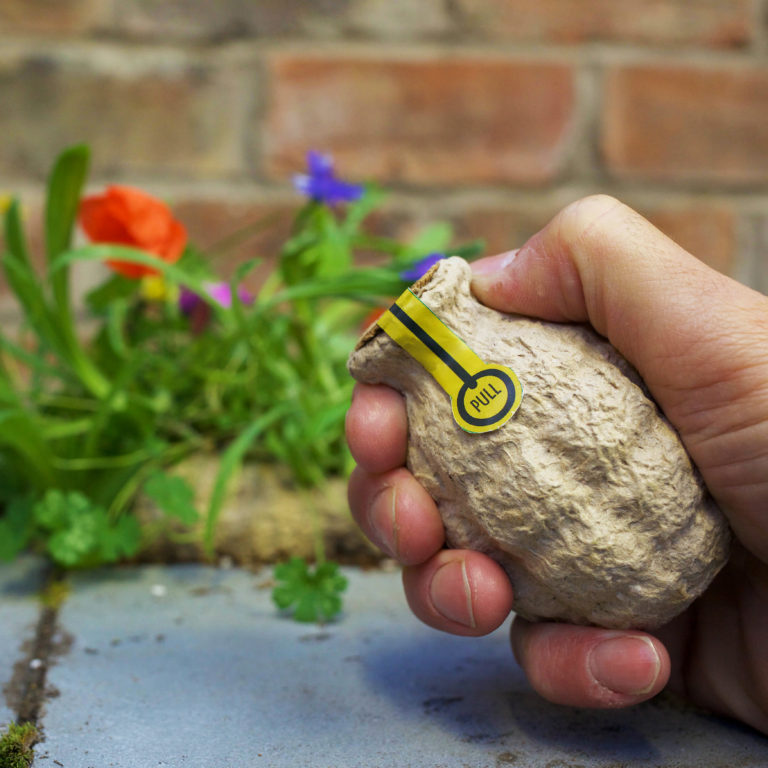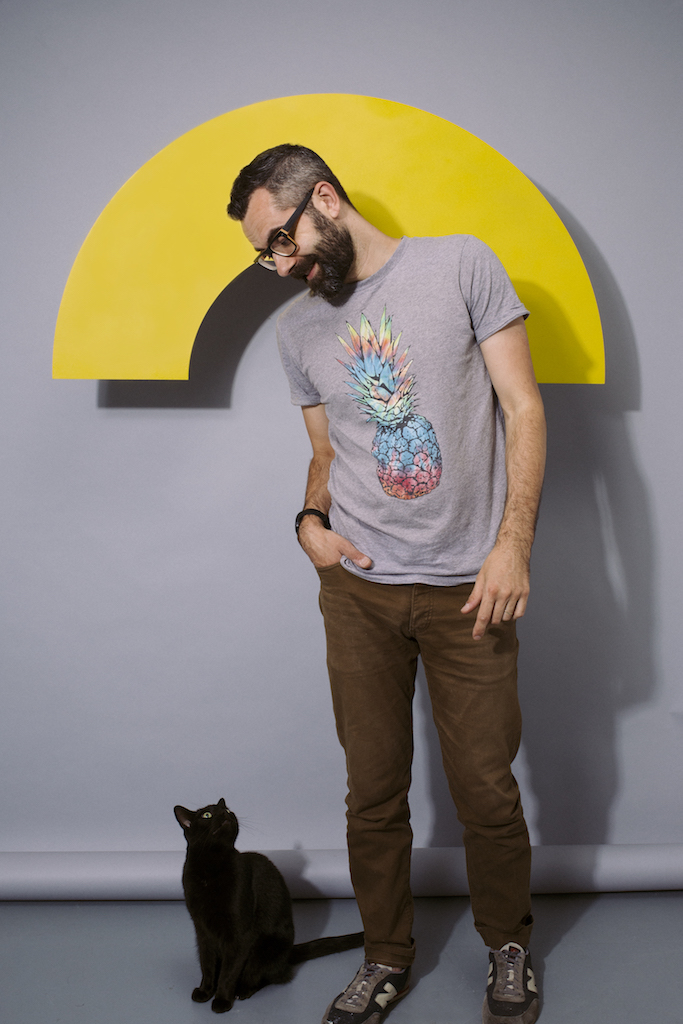
It was whilst studying three-dimensional design and craft that Darren Wilson was to happen upon the idea. Flicking through the pages of a magazine he came across a solitary picture of a grenade, and the image stuck in his mind. More than a decade later and that thought has germinated into a fully-grown business. Wilson’s company, Glasgow-based Kabloom, is manufacturing 5,000 ‘seedboms’ every week and distributing them all over the UK, Europe and to the US.
He is also part of a growing Banksy-style ‘urban guerilla’ greening campaign that is injecting a bit of colour and vitality into the barren and neglected brownfield sites of the industrial city by the Clyde. Guerilla ‘practices’, such as they might be called, involve lobbing a grenade-shaped bio-degradable paper ‘bomb’, laden with wild flower seeds, over the fence of a disused scrub of land, which explodes on impact and eventually brightens the site with flowers for the viewing pleasure of folk passing by.
Kabloom is also a company that has come to the attention of the recently-launched People Make Glasgow Greener campaign, a collaborative project aimed at promoting the city’s green credentials to build on its position as the ‘seventh most sustainable conference destination in the world’ and the only UK city to be included in the Global Destination Sustainability Index (GDS-Index).
THE PROJECT is being led by Glasgow Convention Bureau, which is part of Glasgow Life, and Kabloom is one of 19 partner organisations which have come together to enhance the sustainability offering to event planners, with the goal being to attract more conferences to the city.
Wilson, who graduated from the Gray’s School of Art at Aberdeen’s Robert Gordon University, said: “For me, it’s a great thing to be part of. As a business, we’re Glasgow-based but we distribute Europe-wide and to the US as well; I send a lot of my stuff to London and do a lot of trade shows down south so to do something locally that ties into people visiting the city and see what’s happening is great; it gives you a little bit of pride to be recognised as someone who’s doing something good in the city.”
Although early days, and the plans are still being worked on, the idea is that Kabloom’s seedboms are used within delegate packs as an alternative to what Wilson calls ‘generic promotional gifts’, which are often discarded. As a designer, he hit upon the notion that if he was going to create a product he didn’t want it to “end up in landfill”. He graduated in 2002, and it was only in 2010 when Kabloom was formally established; the business really started to take off in 2015 when Harrods ordered up 10,000 seedboms for a promotional pop-up flowers event in the famous London store, where people were invited to pick paper flowers from a wall for a chance to win a seedbom.

Calling it the ‘tipping point’ for his company, which has also worked with the Royal Horticultural Society at Kew Gardens, Wilson adds: “It was a big commission and we had to quickly re-design the product; I got funding for tooling and approached Cullen packaging, working with them on the industrial design, modelling and tooling. A couple of years ago we were producing 2,000 seedboms-a-week, now with outsourcing we can do 5,000. We’re not a huge profit-making business – we’re more of a lifestyle business – but we have doubled turnover.”
In terms of the product’s paper pulp materials, Wilson describes it as a “bit like an egg box” but without the waxes or sealants. He tells me he takes pride in the fact the company is genuinely “very ethical” but also “fun”, a word he uses repeatedly during our conversation. It strikes a chord, as whilst eco-friendly products are undoubtedly very worthy they are not necessarily that exciting. Kabloom is trying very hard to repurpose the notion of ‘green’, away from the boring or preachy, perhaps, towards the “I must do this now”. Wilson adds: “I’ve created a fun, exciting product that happens to be eco-friendly. That’s the key to getting traction, I think.”
THE GRENADES are soaked before they are lobbed and the shell bio-degrades and eventually disappears; the seeds are contained within the paper mixture itself along with compost, and then nature takes its course. Wilson has made a special Scottish wildflowers seedbom for Glasgow Convention Bureau and has 12 ‘ranges’ in total of different seed mixes; he is also currently developing a new product for the indoor market, which he can’t say too much about except that it will be for the growing of herbs and botanicals and will made from starch-based bio-degradable paper foam, produced in the Netherlands.
As for the conventions market Wilson also sees an opportunity for the seedboms to be incorporated into a conference as an activity, and possibly for Kabloom to run workshops for delegates. Glasgow Convention Bureau itself has trailed the idea of “horticultural therapy” as a team-building activity for conference organisers and has provided a green spaces map of the city where ‘growing areas’ can be found. Wilson has personally identified land close to the Transport Museum which could be used as a seedbom site and Kabloom is also working on greening some areas around the Scottish Event Campus, a notoriously concrete locale.
He says, “The designated green spaces are obviously great but the urban side of things is just urban and you need more of an injection of green. I don’t think it’s a dire situation and that it’s industrial and there’s nothing there, but there’s always room for improvement.”


![Joi, appoints Catch the MICE in collaboration with i3 Events, to drive their global event-sector business Catch_the_MICE_(600×300)[1]](https://eventsbase.co.uk/wp-content/uploads/2023/09/Catch_the_MICE_600x3001.png)
![The Power of Events To Join EVENTIT x Catch the MICE Roadshows As Part of Nationwide Tour Power_of_Events_(600×300)[1]](https://eventsbase.co.uk/wp-content/uploads/2023/11/Power_of_Events_600x3001.png)
